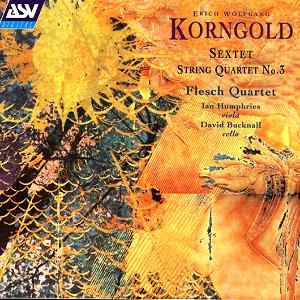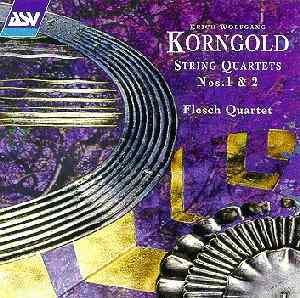
A pleasure to be reviewing this disc after my earlier review of the companion
disc of quartets 1 and 2 (CD DCA 1035). The two works
come from opposite ends of the wunderkind's career.
The sextet is the work of a seventeen year old already enjoying celebrity
and, no doubt, envy. The work is of rosy serenity. Its preoccupation is with
beauty (not a bad choice really!). In this performance and recording I felt
a certain rich weightiness to the texture. This is agreeable but a greater
sense of lift and feather-down would have been welcome. The work strikes
me as offering parallels with Zemlinsky and the moonlit tunefulness of early
Schoenberg rather than, say, the Mendelssohn Octet or even Brahms whose sextets
are quoted as a reference in the admirable notes by Brendan Carroll (who
else?). The music's vitality is well worth encountering although be prepared
for some longueurs along the way.
The third quartet is a different proposition. Written in the USA and dedicated
to Bruno Walter it is a work of lucid tunefulness; clean and without the
weighed-down complexity of the sextet. Mr Carroll points out that this was
the first of his scores to reuse material from the film scores: Between Two
Worlds; The Sea Wolf (a cracking film though not a patch on Jack London's
original novel) and Devotion (recently recorded complete by
Marco Polo) .
Just an aside. The dedication to Bruno Walter reminds me that there is perhaps
a major study (and probably several novels) to be written linking the lives
of so many European ex-pats who, fleeing oppression, found their way to the
States. The list is long: Weill, Korngold, Schoenberg, Eisler, Toch, Karl
Weigl (soon to be the subject of a series of recordings I seem to remember
- he wrote a bewitching violin concerto pioneered by Sidney Harth) and so
on.
ASV's drenched-colour house-style for booklet design remains intact. Playing
time just short of an hour. Keep up the excellent work ASV. Your discs are
invariably of high quality: both collectable and enjoyable as a musical
experience.
Reviewer
Rob Barnett

| Erich Wolfgang KORNGOLD
String Quartets Nos 1 (1924) and 2 (1934)
 Flesch
Quartet Flesch
Quartet ASV CD DCA 1035 [57:31] ASV CD DCA 1035 [57:31] |
|
 |
| |
Crotchet |

Rather like Lyrita, Hyperion and Chandos, ASV have established a house style
for repertoire and booklet design. Their repertoire choice is quirkily
swashbuckling. They are a label of exploration and adventure. ASV's choice
of the Flesch Quartet is well and truly vindicated here as previously it
was for the Rawsthorne string quartets. Their Viennese style of performance
is accurately judged and balanced.
There is nothing of Hollywood in these two quartets, the second of which
dates from just the year before he was invited to the USA. On first hearing
the first quartet hardly registered with me at all. Later hearings
reveal a work of half-lights and gentle melancholy. He had just finished
Die Tote Stadt and at the age of 23 was enjoying a maturity which
for most composers comes twenty years later. The work was premiered on 8th
January 1924. The work had been two years in the writing. The world
it evokes has much inwardness and a certain urbanity which I associate with
turn of the century Vienna. It comes over as a sensually nostalgic work which
is only a shading away from the chamber music of Herbert Howells (try the
1916 piano quartet and the 1923 string quartet). The quiet and sometimes
skittish delight of Korngold's music surely reflects his love for Luzi whom
he was to wed in Vienna on 30th April 1924. The last movement rather outstays
its welcome. In Gramophone (Jan 1998) the reviewer of the Franz Schubert
Quartet playing this work, Nimbus (NI5506), commented that the last movement
had pre-echoes of the score for The Adventures of Robin Hood. In any event
this is a strong work which encourages you to return.
The second quartet (especially the first movement) reminds me of John Foulds'
Quartetto Intimo (on Pearl). It has some of that headlong tumbling
energy and unbounded lyricism. Are the first movement's fanfare evocations
deliberately echoing Beethoven's fifth I wonder. The second movement Intermezzo
takes us on a stroll with the charming and unclouded Erich through the leafy
Viennese streets. Everything is lovingly etched by the quartet. Perhaps this
winning movement was the segment of the quartet which the Flesch performed
in BBC's National Lottery Live programme in September 1997! If you enjoy
the tuneful Bax String Quartet No.1 you are bound to like this as well. The
following 9'02" Lento takes us back into the pastel, shadow and half-light
world of emotion. The final waltz movement skips back to the world of the
Intermezzo. It is difficult to believe that this work, premiered in Vienna
on 16th March 1934, disappeared for years and had to wait until 1997 for
its UK premiere. Presumably it was performed during Korngold's Hollywood
years?
This is the first of two discs which will set out all three Korngold string
quartets. The second disc (yet to be issued) will also offer the String Sextet.
There was a 1977 RCA recording of quartets 1 and 3 (Chilingirian) and of
No. 2 in a mixed Vox Box from the New World Quartet. I heard the Chilingirian
a long time ago and recall fine performances and a dismissive review in
Gramophone. The long-deleted Bay Cities disc of the second quartet (BCD1014)
has a glowingly warm and husky performance which by a couple of degrees outpoints
the Flesch in its gripping immediacy. There may be other recordings but I
do not know of them . In any event here is an accessible and inspired CD
of the first two and a strong pair of performances satisfying in themselves
and whetting anticipation for the next disc. Perhaps the Flesch quartet will
have a go at Bax's Third String Quartet a 40 minute work still awaiting its
CD premiere?
On a personal note it is good to see violist Michael Ponder's name in the
credits as producer. His viola playing no doubt gives him a sensitivity to
the recording of string music which comes over very well in this disc. He
has done some sterling work for various companies. His Klami collection on
Naxos is impressively recorded.
Recommended then but not so much for the fan of full-blooded film music.
If you enjoy chamber music you will relish these recordings and should snap
them up without delay. Korngold completists will already be on the way to
the shops!

Rob Barnett
